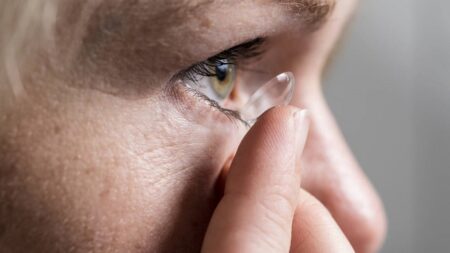IN Australia around half of the population wears glasses or contact lenses. This number only increases as you get older with 95 per cent of people 55 and over having an eye health condition.
Contact lenses can be much more convenient than glasses, being more compact and easier to wear when moving around.
But they come along with their own set of risks, including a rare sight-threatening eye infection.
Acanthamoeba Keratitis, which we’ll just call AK, is caused when an amoeba commonly found in water and soil comes into contact with your eye and infects your cornea.
It’s one of the most severe forms of keratitis (corneal infection) and a quarter of those affected by it require corneal transplants to treat the infection or restore sight loss.
It is very rare, with only 17 to 70 cases per million contact-wearers worldwide, but rates have been rising slowly. With such harmful consequences it’s best to be on the alert.
It’s most common in contact wearers as any microbes on the lens end up right in your eye.
A study by the University of NSW, the University College London and Moorfields Eye Hospital in the UK found reusable soft contacts are more risky than daily disposable lenses, with users 3.8 times more likely to be infected. Of course, this trend is reversed if you reuse disposable lenses more than once, which they are not intended for.
If you wear your contacts in the shower or while swimming, you’re more than three times more likely to get AK and if you wear contacts overnight, you increase your chances by almost four times.
The best way to reduce your risk of getting AK if you’re a contact lens wearer is to follow proper hygiene practices.
This means seeing your eye care provider to make sure your contacts are suitable and following all their instructions.
Don’t wear your contact lenses in water (including in the shower), don’t wear them overnight, make sure to clean and store them properly and wash your hands thoroughly before handling them.
And anyone using reusable lenses might want to consider swapping over to daily disposable lenses. This study found that this could prevent 30-62 per cent of AK cases in the UK.
And of course, if an infection does occur, early diagnosis and treatment is vital to prevent serious complications like vision loss.
If you experience any symptoms including eye pain and redness, blurred vision, excessive tearing or light sensitivity make sure to see a doctor ASAP.
